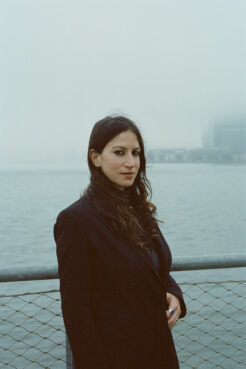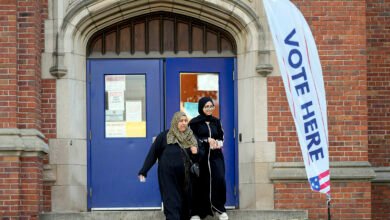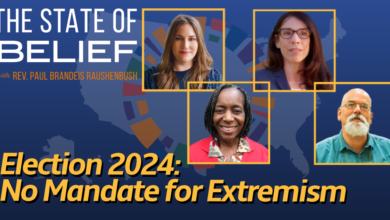
(RNS) — Novelist Hannah Lillith Assadi is the daughter of an American Jewish mother and a Palestinian Muslim father who fled the “Nakba,” or catastrophe, of 1948, when, as Israel declared itself an independent state, Jewish militias emptied villages of Arab residents.
In Assadi’s 2017 novel, “Sonora,” the central character, Ahlam, is half Israeli and half Palestinian, and the divide haunts her parents’ marriage. Ahlam herself is an outcast who runs away to find a life as an artist.
Assadi, 37, who lives in Brooklyn, New York, does not have immediate family in Israel or the occupied territories, but has more distant relatives who have been killed in Gaza.
She has supported the idea of a binational state of Israel where Palestinian refugees are allowed the right to return. “I think that’s the solution I believed would address all the injustices since 1948,” she said.
But the Israel-Hamas war has made her doubt that such a solution is possible. “What’s changed maybe in the last few months is that I don’t know how we come back from this. I think something has irrevocably been damaged.”
In 2021, The Jerusalem Post reported that according to data from Israel’s Central Bureau of Statistics, there were some 85,000 intermarried couples out of Israel’s total of 1.3 million married couples, or roughly 7%. While there is no information about how many of these are Jewish-Palestinian marriages, it can be presumed, given the region’s demographics, that many of them are.
People of a mixed Jewish and Palestinian heritage have described their experience of the Israel-Hamas war as double grief, feeling not only a divide in themselves but seeing it raise tensions among their families and friends.
Since the war began after the Hamas attack on southern Israel on Oct. 7, some writers with both Palestinian and Jewish families like Assadi have written and spoken about their experiences between the two communities since the war began, as they navigate polarizing arguments at home and navigate their own identities.
Assadi said the war has made her Jewish relatives more aware of her support for the Palestinian cause, since she has been very vocal about it on social media. Most of Assadi’s discourse with this side of her family since Oct. 7 has been on social media.
“Nobody has canceled me in my family; I just think it’s more that there’s a certain reserve, and it would be interesting to see how things would pan out if we were in person together, which we just haven’t been.”

Author Hannah Lillith Assadi. (Photo by Jen Steele)
One difficult thing for her Jewish family to hear, Assadi said, is that her support for U.S. President Joe Biden has been diminished in the past few months due to his policies.
However, Assadi has also had some fruitful conversations with her family about the conflict. “There’s just been some very civilized disagreements with certain members of my family, over, just, op-eds passed around where I’ve just said, ‘I don’t agree with this,’ and we’ve had a very constructive dialogue about why,” she said.
But Assadi said she has lost a very dear friend, who is Jewish, over their disagreements about the conflict.
“I want to believe that if we were able to be in person together, and looking each other in the eye, it wouldn’t have been as easy for this to happen,” Assadi said.
Assadi added that she knows this is happening to many across diaspora communities who are Palestinians or allies of Palestinians as well as supporters of Israel.
Assadi said she may revisit the topic of Jewish-Palestinian identity and the conflict, in her writing, but not immediately. “Part of the reason for that is, the ship is still in the storm! This isn’t over yet, and I don’t know where the shore is. Maybe, when there’s a cease-fire, we’re standing on the shore, and I can actually see it a little bit more clearly.”
But she said that writing is the only way she knows how to deal with the situation. “I’m not a politician, I’m not a spokesperson, I’m not by nature an activist,” she said.
Writer and journalist Mya Guarnieri, who holds both U.S. and Israeli passports, is raising two children in South Florida with her Palestinian ex-husband. Guarnieri reported in Israel and the Palestinian territories for nearly a decade and in 2017 published “The Unchosen: The Lives of Israel’s New Others,” about the plight of asylum-seekers and migrants in Israel. Her next book, due out next year, depicts her Romeo and Juliet-like relationship with her ex-husband.
Guarnieri, whose daughter is 8 and son is 6, is raising her children to feel at ease with their varied identities. “They know that I have an Israeli passport and citizenship. They do not have Israeli citizenship, and I’ve never identified them as Israeli. My ex-husband identifies as Palestinian, and I think they identify as probably American-Palestinian, but also Jewish and Muslim. And they don’t see a conflict between those identities,” she told RNS.
She is raising them to understand all three of the major Abrahamic religions, telling them that when they are older, they can choose any religion they want.
As her ex-husband is not a practicing Muslim, she has taken charge of her children’s Islamic education, bringing them occasionally to a mosque, fasting during Ramadan and making iftar, the meal that Muslims eat when they break their daily fast.
“We talk about how in Islam, Issa, the Arabic name for Jesus, is a prophet. We talk about how in Judaism, we’re still waiting for the Messiah. And that we don’t accept Jesus as our Messiah. So we engage really deeply with Christianity as well,” Guarnieri said.
One difficult thing for Guarnieri to deal with has been the silence of people around her in South Florida, who are neither Jewish nor Muslim. She said that since October 7, most of her friends have “just taken this track of not addressing anything with me at all.”
She added that there have not been conflicts in her larger family, whom she describes as “quite progressive” in their views on the conflict, while she said the children don’t speak very much to their family in the West Bank.
She said, “I want them to understand there’s no side to pick, you can be on the side of humanity.”
Source link




